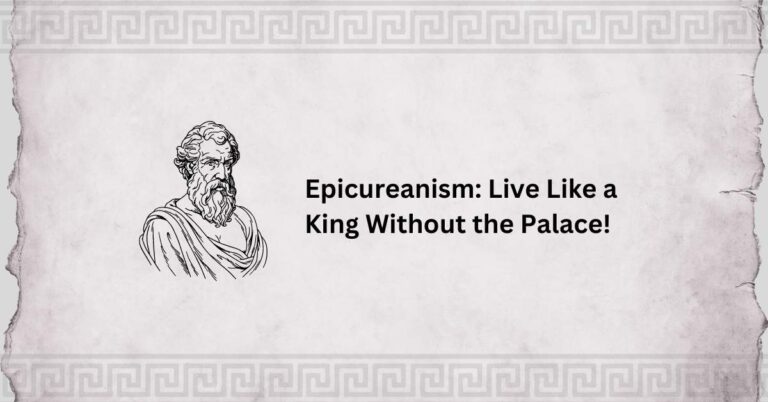Neo-Kantianism: A 5-Point Minimalist Breakdown!
Ever wondered how Immanuel Kant’s ideas still shape our world today? Kant’s influence on modern philosophy is profound and far-reaching.
Neo-Kantianism is a philosophical movement that reinterprets and revives Kant’s ideas. It emerged in the late 19th century and has significant implications for various fields.
In this post, you’ll discover the origins, core principles, and impact of Neo-Kantianism. Understanding this movement can deepen your appreciation of modern philosophy and its relevance to contemporary issues.
1. Historical Background of Neo-Kantianism:
Origins and Development
Neo-Kantianism began in the late 19th and early 20th centuries. It emerged as a response to new scientific advancements and shifts in philosophical thought. The movement aimed to adapt Immanuel Kant’s ideas to address contemporary issues. This was a time when the scientific method and empirical research were becoming increasingly important. Neo-Kantians sought to bridge the gap between classical philosophy and modern science.
Key historical events also played a role. The Industrial Revolution and the rise of positivism influenced philosophical discussions. Neo-Kantians argued that Kant’s ideas could provide a solid foundation for understanding these changes. They believed that by revisiting Kant, they could find answers to the challenges posed by modernity.
Key Figures in Neo-Kantianism
Several philosophers were instrumental in developing Neo-Kantianism. Hermann Cohen was a leading figure. Born in Germany in 1842, Cohen focused on the relationship between science and philosophy. He argued that Kant’s ideas could be used to understand scientific principles. Cohen’s work laid the groundwork for the Marburg School of Neo-Kantianism.
Paul Natorp, another key figure, expanded on Cohen’s ideas. Born in 1854, Natorp emphasized the importance of education and psychology in philosophy. He believed that understanding human cognition was essential to Neo-Kantian thought. Natorp’s contributions helped shape the broader Neo-Kantian movement, integrating Kant’s ideas into new areas of study.
Both Cohen and Natorp significantly influenced how Kant’s philosophy was interpreted and applied. Their work ensured that Kantian principles remained relevant in the face of modern scientific and philosophical challenges.
2. Core Principles of Neo-Kantianism:
Reinterpretation of Kant’s Ideas
Neo-Kantians reinterpreted Kant’s original ideas to fit modern contexts. They focused on epistemology, ethics, and metaphysics, updating Kant’s theories to address contemporary issues.
In epistemology, they explored how we gain knowledge and understand the world. They emphasized the active role of the mind in shaping experiences. This approach helped reconcile scientific advancements with philosophical inquiry.
In ethics, Neo-Kantians expanded on Kant’s moral philosophy. They maintained the importance of duty and moral laws but considered the social implications of ethical actions. Metaphysics was also reexamined.
Neo-Kantians sought to understand the fundamental nature of reality while considering the limits of human knowledge. They believed that Kant’s ideas could provide a framework for these explorations.
Emphasis on Science and Knowledge
Neo-Kantians placed a strong emphasis on the sciences and knowledge. They believed that understanding scientific principles was crucial for philosophical inquiry. This emphasis distinguished them from other philosophical movements of their time. They argued that the natural sciences and humanities were interconnected. The natural sciences, such as physics and biology, provided insights into the physical world. Meanwhile, the humanities, like literature and history, offered an understanding of human experience and culture.
Neo-Kantians believed that both fields were essential for a complete understanding of reality. They advocated for a balanced approach, integrating scientific knowledge with philosophical analysis. This perspective helped bridge the gap between empirical research and theoretical exploration, ensuring that both areas contributed to a comprehensive view of the world.
3. Impact on Various Disciplines:
Influence on Philosophy
Neo-Kantianism has significantly shaped modern philosophical thought. It reintroduced and revitalized Kant’s ideas, making them relevant to contemporary discussions.
Many modern philosophical debates, especially those in epistemology and ethics, were influenced by Neo-Kantian principles. The movement encouraged philosophers to consider how knowledge is constructed and how moral laws apply in a modern context.
Philosophers engaged in lively discussions about the limits of human knowledge and the role of perception in understanding reality.
These debates helped bridge the gap between classical philosophy and modern scientific thought. Neo-Kantianism also prompted philosophical inquiries into the nature of reality, ethics, and the role of human cognition.
Impact on Social Sciences and Humanities
Neo-Kantianism played a crucial role in developing the social sciences and humanities. In sociology, it influenced the way scholars understood social structures and human behavior. Neo-Kantian ideas helped shape the methodologies used to study societies, emphasizing the importance of both empirical data and theoretical frameworks.
In psychology, Neo-Kantianism contributed to understanding human cognition and perception. It provided a foundation for exploring how individuals interpret and interact with their environments. Cultural studies also benefited from Neo-Kantian insights. Scholars used these principles to examine cultural phenomena, emphasizing the interplay between individual experiences and broader social contexts.
Specific examples include the work of sociologist Max Weber, who integrated Neo-Kantian ideas into his analysis of social action and institutions.
In psychology, Wilhelm Wundt’s experimental methods were influenced by Neo-Kantian principles, focusing on how mental processes shape our understanding of the world. These influences demonstrate the widespread impact of Neo-Kantianism across various disciplines, shaping modern academic thought and research.
4. Criticisms and Challenges:
Philosophical Criticisms
Neo-Kantianism has faced several criticisms from other philosophical perspectives. Some argue that it is too abstract and disconnected from practical concerns. Critics claim that Neo-Kantians focus too much on theoretical aspects, neglecting real-world applications.
Others believe that Neo-Kantianism doesn’t adequately address the complexities of modern science. They argue that it falls short in explaining new scientific discoveries and advancements.
Another criticism is that Neo-Kantianism is overly rigid in its interpretation of Kant’s ideas. Some philosophers feel that this rigidity limits the ability to adapt to new philosophical and scientific developments. These limitations pose challenges for Neo-Kantian thinkers trying to apply their principles in a rapidly changing world.
Historical and Contemporary Relevance
The relevance of Neo-Kantianism in today’s philosophical landscape is a subject of debate. Some argue that its emphasis on the relationship between knowledge and experience remains significant.
Neo-Kantian ideas continue to influence discussions on epistemology and ethics. They provide a framework for understanding the interplay between human cognition and the world.
However, others believe that newer philosophical theories offer better explanations for contemporary issues. They argue that Neo-Kantianism focus on Kant’s ideas may be outdated.
Despite these arguments, Neo-Kantian principles still have an application in modern contexts. They help address ethical dilemmas and guide scientific inquiries.
Supporters of Neo-Kantianism argue that its principles are adaptable and can evolve with new insights. They see it as a foundational framework that can be expanded upon.
Critics, however, maintain that the movement’s historical context limits its applicability today. The debate over Neo-Kantianism’s significance continues, reflecting its complex role in modern philosophy.
5. Neo-Kantianism in Modern Contexts:
Revival and Modern Interpretations
In recent years, there has been a revival of interest in Neo-Kantianism. Contemporary philosophers are revisiting and reinterpreting its principles to address modern issues.
For example, philosophers like Jürgen Habermas and Karl-Otto Apel draw on Neo-Kantian ideas. They use these principles to explore topics such as communication, democracy, and social justice.
This modern revival highlights the enduring relevance of Neo-Kantian thought in contemporary philosophical discussions.
Practical Applications
Neo-Kantian principles are being applied to modern ethical, social, and scientific issues. In ethics, they guide discussions on moral dilemmas and human rights. For example, Neo-Kantian ideas influence debates on bioethics, helping to navigate complex issues like genetic engineering and medical ethics.
In the social sciences, Neo-Kantianism informs approaches to social justice and policy-making. It provides a framework for understanding social structures and advocating for equitable policies. For instance, Neo-Kantian principles have been used to analyze the ethical implications of social welfare programs.
In scientific contexts, Neo-Kantianism helps bridge the gap between empirical research and philosophical inquiry. It encourages a holistic view of scientific practices, considering both methodological rigor and ethical considerations. Case studies, such as the ethical review processes in clinical trials, illustrate the practical impact of Neo-Kantianism in ensuring responsible scientific conduct.
Conclusion:
Understanding Neo-Kantianism is crucial for navigating the complexities of modern philosophy and its applications.
Neo-Kantianism began as a response to scientific advancements and has shaped various disciplines, including philosophy, sociology, and psychology. While it has faced criticisms for being too abstract, its principles remain relevant in contemporary debates.
The movement has experienced a revival, with modern philosophers drawing on its ideas to address ethical, social, and scientific issues.
By exploring Neo-Kantianism, we gain valuable insights into the relationship between knowledge, ethics, and reality.
Reflecting on its principles encourages us to think critically about our world and our place in it. Consider how Neo-Kantian ideas can illuminate your own philosophical inquiries and guide your ethical decisions.



